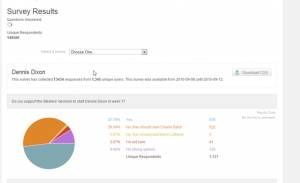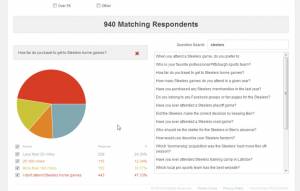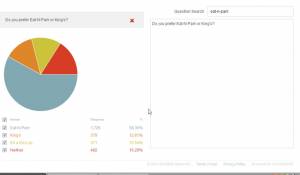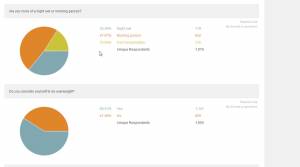Civic Science compiles consumer data on site visitors for free
Post-Gazette tries it out with good results
Most current online sales materials are terrible, partly because the research itself is limited or national.
A free way to collect in-depth marketing data on the online audience is CivicScience, Inc., which places engaging polls that roll-up into accumulative statistical data.
The Post-Gazette sales force uses this information to talk to advertisers about specific demographic characteristics and habits of site visitors: Exactly how many site visitors follow football, have dental insurance, contributed to a political candidate or like one car versus another one. Questions that advertisers request can also be purchased.
Here's how the program works: CivicScience places a simple three question poll on the site. The first question of each poll is controlled by the local media partner; relating to editorial content, such as the following:

Use an editorial question to draw visitors into the poll - they will answer two more - and acquire information about interests in new channels on the road map. Here's a question that could be important in selecting a promotional partner, developing a new format or just generating a new item:

The next two questions are generated by CivicScience and can be used to collect data, such as age, income or area of residence, brand preference, political views or other information.
Then each time a visitor returns to the site, they are tracked by cookies which personalize the questions based on previous answers to deliver increasingly relevant questions that build consumer data. Data shows up on dashboards which can be printed, like Media Audit, for sales calls. Here's an example of results editorial sports question, as seen from the back end of the site:

Now here are results for marketing-oriented questions that profile sports readers :

Typically questions start with demographics and go deeper into brand affliations: Would you rather buy a BMW or a Mercedes? Which bank do you use and how would you rate their service? CivicScience includes questions about a few local brands who might be willing down the line to subscribe to the service independently. Here's an example of using a local brand names in the polls:

Some extra questions are deeper profiles questions used by national advertisers that CivicScience sells on a subscription basis. It correlates data such as Mac versus PC users and Cat versus Dog Lovers:

Since CivicScience resells both subscriptions to subsets of data and the questions themselves to national brands, it doesn't charge media partners who have access to all of their own data from their site. The media partner's identity is protected as the data source.
Of course, there are brand affiliation questions and responses to national campaigns, such as Starbucks flavored coffee. It showed up as a favorite among 18 to 29 year-olds before revenue reports could tabulated and in time to optimize campaigns.
Ford may also buy buy a subscription to the dashboard that shows how consumer respond to questions about their competitors. Or they can buy extra questions.
Here's a screenshot of how a variety of brand awareness tests are seen:

Not only is this service free, but the media company also gets paid, via revenue share from national brands, based on the number of answers to any question that comes from their market. But this is really about gaining highly valuable research on site visitors without paying for it
With nearly a million people taking the polls daily on more than 100 sites, there are a total of 1000 questions and on any given day, no one answers the same question twice.
Of the 1000 questions, 600 are about the most popular consumer brands, 120 are about celebrities, and there are 54 questions on profiles.
John Dick, founder and CEO of CivicScience, says the only objections to the service from newspaper companies he's approached so far have been from heads of interactive who can't find real estate for the fixed position, or editors resisting the cross-over nature of editorial polls used for commercial purposes.
Readers on local media sites are being tracked anyway, by Yahoo and other companies. This consumer data is much too valuable to pass up. This kind of polling greatly improves the ability to show audience value and is better than many more expensive services, and more accurate then telephone surveys.

The author, Alisa Cromer is publisher of a variety of online media, including LocalMediaInsider and MediaExecsTech, developed while on a fellowship with the Reynolds Journalism Institute and which has evolved into a leading marketing company for media technology start-ups. In 2017 she founded Worldstir.com, an online magazine, to showcases perspectives from around the world on new topic each month, translated from and to the top five languages in the world.





